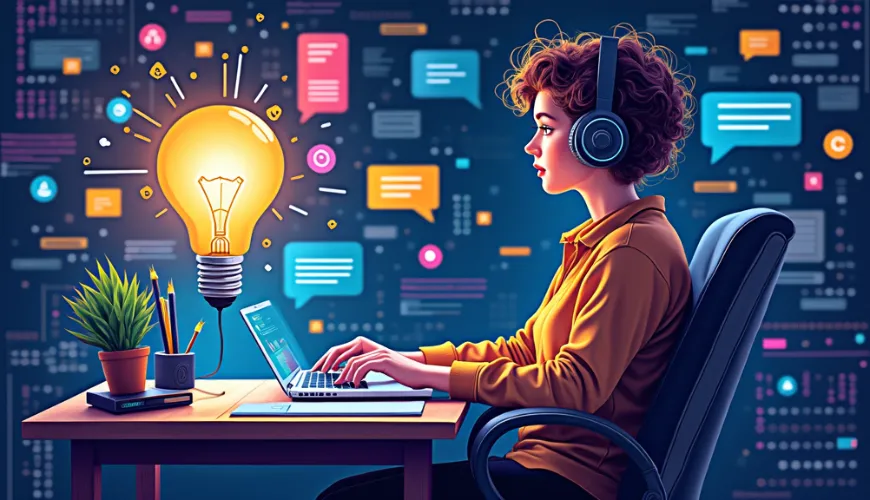TL;DR ChatGPT Operators bridge the gap between human intent and AI output. They craft precise prompts, audit results, and turbo‑charge workflows. Master these skills now to future‑proof your career.
The rise of AI has introduced a variety of new roles—and one of the most intriguing is the ChatGPT Operator. Whether you're curious about what this role involves or wondering how to become one, you're not alone. As companies lean more on artificial intelligence tools like ChatGPT, the demand for skilled operators is rapidly growing.
But what exactly does a ChatGPT Operator do? How is it different from just chatting with an AI? And can this be a viable career path in the near future?
Let's unpack everything you need to know about this emerging role.
Understanding the ChatGPT Operator Role
At its core, a ChatGPT Operator is someone who knows how to effectively prompt, guide, and manage conversations with ChatGPT or similar large language models. This isn't just about typing a question into a chatbot. It's about crafting precise inputs, known as prompts, to get the most useful and accurate outputs.
Think of a ChatGPT Operator like a translator between human needs and AI capabilities. They ask the right questions, frame the right instructions, and understand how to iterate when the AI's response isn't quite right.
This role can vary depending on the context. In a marketing team, a ChatGPT Operator might generate content ideas, write product descriptions, or schedule social media posts. In customer support, they might help automate responses or train the AI on brand-specific FAQs.
It's part technical, part creative, and entirely necessary in today's AI-enhanced workplace.
Why the ChatGPT Operator Role Matters
As AI tools like ChatGPT become more integrated into our daily workflows, the need for human guidance remains critical. While ChatGPT is impressively intelligent, it's still only as good as the prompts it receives.
For example, if you ask ChatGPT, "Tell me about marketing,” you'll get a broad, general response. But if a ChatGPT Operator asks, "Write a 200-word email introducing a new skincare product to eco-conscious Gen Z customers,” the AI can deliver something far more targeted and useful.
That's the power of the operator: Knowing how to speak the AI's language.
In many cases, this can save companies hours of work. Instead of writing and editing content from scratch, operators can generate first drafts, outlines, or even complete documents that are 90% ready to go.
For a deeper dive into prompt-quality metrics, see our Best ChatGPT Plugins guide.
Key Skills of a ChatGPT Operator
So what skills do you need to thrive in this role? It turns out, you don't need to be a coder or a tech wizard. Most successful ChatGPT Operators come from communication-heavy fields like writing, marketing, teaching, or support.
Here are a few must-have skills:
- Prompt Engineering: Knowing how to write clear, effective prompts that lead to accurate and relevant AI responses.
- Critical Thinking: Evaluating AI output for accuracy, tone, and usefulness.
- Adaptability: Being able to tweak instructions and iterate quickly for better results.
- Domain Knowledge: Understanding the subject matter the AI is being used for—whether it's sales, education, programming, or healthcare.
- Basic AI Literacy: While deep technical knowledge isn't required, understanding how large language models work (and their limitations) is crucial.
With these skills, ChatGPT Operators can become indispensable team members in almost any field.
How ChatGPT Operator Mode Works
One of the most important aspects of this role is using ChatGPT Operator Mode effectively. While not an official term from OpenAI, it refers to working intentionally and strategically with the AI—almost like flipping a switch between casual use and professional operation.
For instance, instead of simply chatting, a ChatGPT Operator might:
- Use system-level prompts or custom instructions to guide the AI's personality or tone.
- Chain multiple prompts together in a sequence to teach the AI a complex task.
- Evaluate outputs and re-prompt as needed, creating a feedback loop that fine-tunes results.
If you've ever used ChatGPT's "Custom Instructions” feature, you've already dipped your toes into operator territory. This feature allows you to tell ChatGPT what you want it to know about you and how you'd like it to respond—two key areas operators leverage heavily.
Real-Life Examples of ChatGPT Operators in Action
Let's bring this role to life with some relatable scenarios:
Social Media Manager — A small‑business owner prompts ChatGPT with a brief such as "Create a warm, engaging caption for a photo of handmade candles targeting wellness‑focused millennials.” The result is ready‑to‑post copy in seconds.
Customer‑Service Lead — By building a reusable prompt library for refunds, shipping delays, and product FAQs, an operator enables frontline staff to deliver consistent, on‑brand answers 24/7.
Freelance Writer — Independent creators save hours by asking ChatGPT to draft outlines, keyword tables, and first‑pass paragraphs, then polishing the text manually for voice and nuance.
In each case, the operator isn't just saving time—they're producing better results with less friction.
Tools That Support the ChatGPT Operator Role
Being a great operator isn't just about knowing what to say. It's also about using the right tools.
Platforms like Claila make this easier by offering access to multiple language models—including ChatGPT, Claude, Gemini, Grok, and Mistral—all in one place. That means operators can compare outputs, choose the best fit for the task, and streamline their workflow.
Other helpful tools include:
Well‑tested prompt libraries provide ready‑made instructions you can adapt in seconds. A simple Notion or Trello board keeps versions organised, while an AI image generator pairs text with visuals for richer deliverables—see how we removed backgrounds flawlessly in our guide to the Magic Eraser.
When you combine these tools with operator know-how, the productivity gains are hard to ignore.
How to Become a ChatGPT Operator
If you're interested in this path, the good news is—it's open to just about anyone willing to learn.
Quick 5‑Step Operator Tutorial
- Explore basic prompts – Ask ChatGPT to summarise yesterday's e‑mails to feel the difference between vague and specific requests.
- Refine with custom instructions – Add "You are a B2B copywriter” in the system prompt and note the tonal shift.
- Iterate & critique – Highlight weak sentences, tell the model to rewrite them, and compare outputs.
- Save winning prompts – Clip the best examples into a Prompt‑Portfolio database.
- Test cross‑model workspaces – Try the same prompt in Claila's Claude‑3 panel for contrast.
With consistent practice, you might find yourself turning this skill into a serious side hustle—or even a full-time role.
The Future of ChatGPT Operators
As AI continues to evolve, the ChatGPT Operator role is likely to evolve with it. We're already seeing the rise of more advanced prompt frameworks, integrations with business tools, and even AI agents that complete tasks autonomously.
However, even the most advanced AI still needs human guidance. That's why operators aren't just a temporary bridge—they're part of the long-term structure for how we work with machines.
According to McKinsey, generative AI could add up to $4.4 trillion annually to the global economy, especially by augmenting roles in marketing, customer service, and education[^1]. ChatGPT Operators will be at the center of that transformation.
[^1]: McKinsey & Company, "The economic potential of generative AI: The next productivity frontier," June 2023.
One Step Ahead with Claila
If you're serious about stepping into the ChatGPT Operator role, it's worth exploring platforms that are designed for this kind of work.
Claila offers a centralized AI workspace where you can access multiple models, organize prompts, and create full-scale content solutions. It's ideal for freelancers, teams, or anyone looking to maximize what AI can do for them.
Instead of having five tabs open for five tools, Claila brings them all together—saving you time, hassle, and confusion. And with support for multiple AI models, you can become a more versatile operator who knows how to pick the right AI for the job.
It's Not Just a Role—It's a New Kind of Skill
The ability to operate ChatGPT and other AI tools effectively is quickly becoming a must-have skill. Whether you're managing content, running a business, or just trying to be more productive, knowing how to guide AI is like having a superpower.
Being a ChatGPT Operator isn't reserved for techies or engineers. It's for anyone who's willing to learn how to communicate clearly, experiment boldly, and work smarter with the help of machines.
And in a world that's moving faster than ever, that edge might be exactly what you need.
FAQ
Q1. Do I need coding skills to be a ChatGPT Operator? No—clear writing and critical thinking matter more. However, learning basic scripting can super‑charge repetitive tasks.
Q2. What salary can operators expect in 2025? Entry‑level freelance gigs on platforms like Upwork start around USD 35/hr, while in‑house "Prompt Engineers” routinely exceed USD 100K.
Q3. Where can I practise advanced prompt tactics for free? Create a Claila free account and pair it with our AI Kissing Generator walkthrough to see multimodal prompting in action.
Q4. How is this different from traditional copywriting? Operators use AI as a co‑writer, cutting ideation time by up to 70 %—a workflow we break down in the Musely case study.



